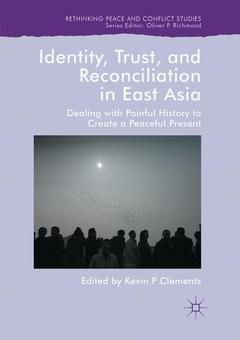Description
Identity, Trust, and Reconciliation in East Asia, Softcover reprint of the original 1st ed. 2018
Dealing with Painful History to Create a Peaceful Present
Rethinking Peace and Conflict Studies Series
Language: English
Subject for Identity, Trust, and Reconciliation in East Asia:
Publication date: 08-2018
Support: Print on demand
Publication date: 10-2017
Support: Print on demand
Description
/li>Contents
/li>Biography
/li>Comment
/li>
This edited collection explores how East Asia?s painful history continues to haunt the relationships between its countries and peoples. Through a largely social-psychological and constructivist lens, the authors examine the ways in which historical memory and unmet identity needs generates mutual suspicion, xenophobic nationalism and tensions in the bilateral and trilateral relationships within the region. This text not only addresses some of the domestic drivers of Japanese, Chinese and South Korean foreign policy - and the implications of increasingly autocratic rule in all three countries ? but also analyses the way in which new security mechanisms and processes advancing trust, confidence and reconciliation can replace those generating mistrust, antagonism and insecurity.
1. Trust/Identity and Conflict in North East Asia- Barriers to positive relationships and security.- 2. Historical Analogy and Demonization of Others: Memories of 1930s Japanese Militarism and Its Contemporary Implications.- 3. The “Abnormal” State: Identity, Norm/Exception and Japan.- 4. Identity Tensions and China-Japan-Korea Relations: Can Peace be Maintained in North East Asia? .- 5. Trust and Trust-Building in Northeast Asia: The Need for Empathy for Japan-ROK-China Security Cooperation A Japanese Security Perspective.- 6. Historical Memory and Northeast Asian Regional Politics From a Chinese Perspective.- 7. Identity, Threat Perception, and Trust Building in Northeast Asia.- 8. Toward True Independence: Shinzo Abe’s Nationalism.- 9. History, Politics and Identity in Japan.- 10. Apology and Forgiveness in East Asia.




